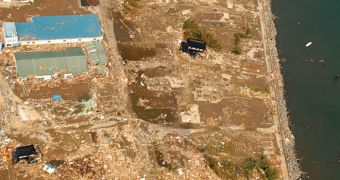Following the March 11 earthquake that struck Japan, authorities and the population alike have been caught in a whirlwind of activities that need to be performed immediately, such as relief response, clean-up, search and rescue and so on. The psychological damage of the tremor will develop later on.
At least this is the opinion of a British psychologist based at Queen Mary, University of London (QM). The expert believes that the deep psychological damage that the magnitude-9.0 earthquake caused has not been brought to the surface yet.
She adds that the damage has been done however, and that it will linger on in latent form inside the general population until other worries subside, and it's time for it to come out. The most common response to this will be depression, the scientist explains.
Contributing to this will be all of the main areas of concern the Japanese people has been faced with since March 11: the earthquake, the tsunamis, and the crisis at the Fukushima Daiichi nuclear plant.
According to QM psychologist Dr. Magda Osman, these worries – as well as the things people have seen during these past few days – will leave deep scars that will translate into bouts of depression.
“A disaster like the Japan earthquake has such wide-ranging implications, especially on the psychological well-being of those affected. After a disaster, typically small communities become incredibly co-operative and pull together to help each other and start the rebuilding process,” she says.
“There’s an immediate response where people start to take control of the situation, begin to deal with it and assess and respond to the devastation around them,” Osman explains, quoted by PsychCentral.
The long-term psychological health effects of disasters, she says further, are a topic in science that has been widely neglected since forever. The scientist explains that the realization of what just happened will come incrementally, not all at once.
“After about two months of re-building and cleaning up we tend to experience a second major slump when we realize the full severity of the situation in the longer term,” the QM expert adds.
“This is what we need to be wary of because this triggers severe depression,” Osman argues. Our sense of control over things around us is the primary target of depression in these circumstance.
No longer feeling in control, people tend to realize the fleetness of life, and that their lifespans are limited to. This is nothing new, but nobody likes being reminded of the inevitable,especially in this manner, Osman explains.
“Setting goals is the best way of helping to exert or take back control. Working towards goals helps us to gain a lot of information about a situation,” she adds.
“Goals act like a yardstick to compare future events against. This helps to reduce our feelings of insecurity because it gives us a way of interpreting the good and bad experiences that happens,” Osman concludes.

 14 DAY TRIAL //
14 DAY TRIAL //